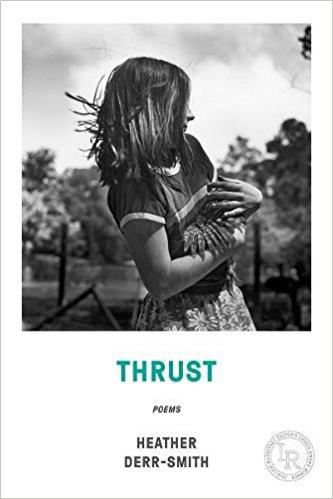
Heather Derr-Smith’s fourth collection Thrust, winner of Persea Books’s Lexi Rudnitsky Prize, is a volume of exorcism and ecstasy, of violence and desire. It takes her out of some of her earlier work’s terrain—the refugee camps of Syria and Bosnia-Herzegovina—and into ruins far closer to home: the American South, where her speaker was conceived in distinctly American sin. The broken lines of her opener, “Hide Out,” hint that what’s to come is lethally perverse. It’s the only sort of warning we get before the speaker takes us by the hand into the wilderness of eastern Virginia (“all of it battlefield”), where an overpowering older boy “made for coming like a second coming” sexually abuses her as a child. This is her initiation into a cultural hellscape of obscene sanctimony and naked hypocrisy, a cosmos created and sustained by the likes of Jerry Falwell, the creators of The Exorcist, and Jim Jones. Onto her body, men will project their modern, pornographic fantasies of indulging and subduing the satanic. “Before the violence of adulthood was the violence of childhood,” she says, “and before that a whole history of bloodshed as inheritance.”
It’s a world no girl would ever want to be born into, much less born again. In “Stitch,” the speaker finds herself terrorized “in the house of her childhood, now empty… sobbing in the closet behind the silk nightgowns / and the AR-15’s, / a force that had seemed unstoppable, nitroglycerin in her veins, / threatening to blow them all to smithereens. She was untouchable, / outside the reach of God, Heathen.” She seems headed for the psychic vortex of a Winehouse or Plath, where impulses toward self-destruction, murderous rage, and narcotic escapism can flood the nervous systems of those forced to entertain thoughts like these in “Mercy Seat”: “I was raped, just a few years ago… I comforted him, spoke / to him like a mother to her son. / And that’s the crux. Sometimes a stranger rips you apart / calls you a bitch and cunt and you say to him— / Do you know what you say? You say: It’s going to be OK. / Everything is going to be all right.” After that kind of rupture, even the most ecstatic intimacies with a male lover could become torturous in a flash. In “The Sweet Spot,” the adult in recovery faces “the harsh morning light, / all night cutting / my thighs with a steak knife, half-berzerk / with desire for the ghost of you gone, / alcohol in the blood, / stinging as it seeps through the slit.”
Any shot at salvation the speaker has lies in various lifelines, assorted portals to other planes of reality and sources of power. Sometimes she casts spells and sets fire to the world around her; in “XXX,” a poem about adolescence, a boy “pushed her down in the honeysuckle / and tried to fuck her, but she punched him off, jab / to the neck, her palm facing the ground . . . The girl’s hair lifted like veins— / not biblical, not evangelical, but something primitive / and voodoo. Made of stardust. Made of dirt. / Made of slut.” Elsewhere, she imagines queering the false, binary choices offered by a patriarchal culture. In “The Quarry,” she recalls watching her male teenage peers cliff diving: “What I liked is how they seemed to me oblivious to their sex / in a way that girls weren’t allowed to be. The boys were bodies / of pure delight, a buzzing heat in the fiber and chord / of their nerves that I was barred from. No dichotomy in them, / more than lust, an inhabitation that is perfectly at home / in its leap and thrust. / At fifteen I wanted to be them. I want to be them now. / The boy of myself, leaping over the edge.” At a later life stage, she even gives peace a chance, taking cover with Mennonites who offered home remedies of grace and healing to a woman poisoned and ravaged by a misogynist religious right.
But the poems cast serious doubt on whether, after trauma, reclaiming Christianity can be redemptive; a radical rejection and reconstruction of everything that formed her and sought to destroy her seems more in order. Finding sanctuary first in nature (“those woods, my basilica”) and then in literature (Nabokov, Camus, and others become her artistic communion of saints), she had to venture far from home to discover for herself that “most anything torn can be mended.” She needed to “reclaim the body, its pain / even, ours to thrill and tremble,” vowing to “make love out of the kick and the punch. / Make beauty out of cunt, a glowing ember.” That meant taking off the veil and getting into the mosh pit and the ring. Poems like “Glass Jaw,” “K.O.,” and “One Last Thing” make boxing a psychological touchstone, and it’s no accident that the man the speaker perhaps mourns the most is neither father nor brother but Muhammad Ali, somebody who could speak so powerfully, move so gracefully, and hit so hard as to make all unholy empire quake and stagger. Thrust has that kind of swagger, and it should be seen as essential feminist and southern literature. In “Last Breath,” the speaker anoints herself an “insurgent and fugitive girl made infinite,” both specter and incarnation of an emerging, radical resistance. It’s enough to make us all believe.
